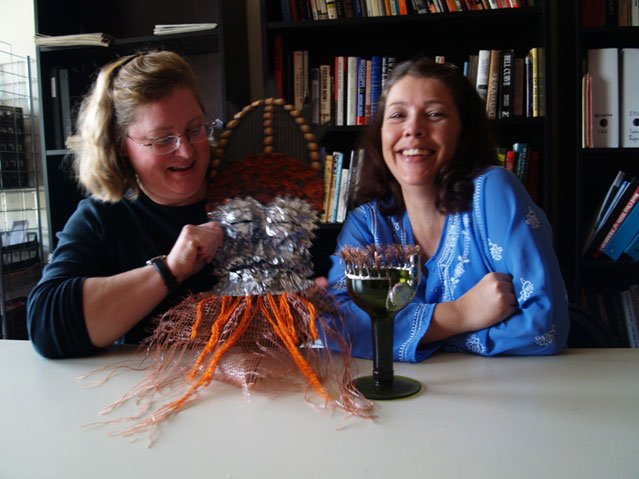Jo Patterson (left) and Alissa DiAmonti (right) show off work from their exhibits "Let's Face It" and "Pane Free," both currently on display at ARTichoke.
Despite having a joint art exhibit in the ARTichoke gallery, Jo Patterson, 46, and Alissa DiAmonti, 41, only recently met for the first time. The women's show consists of works made almost completely from found and recycled objects. "We want to show people that recycling is not ugly," DiAmonti says.
Patterson's expo "Let's Face It" is a collection of masks, and DiAmonti's "Pane Free" is an arrangement of glass creations. Their combined years as practicing artists are testaments to their devotion to their craft, and while Patterson is an Arkansas native and DiAmonti is originally from California, the two share similar environmental opinions that inform their art.
What came first in your life: art or your environmental views?
Patterson: I had parents who were raised in the Depression. They were very frugal, very conservative. I remember when the Malibu Barbie Dream House came out, and I wanted one because (my friend) Patty had one. My mom wasn't paying 65 bucks for that, so she went to the attic, got some cardboard, and we made one with three stories. I was a little upset at first, but when she folded a couch out of the cardboard, I said: "This is cooler than Patty's." We made something out of nothing. So they kind of went hand-in-hand for me.
DiAmonti: Environmental views for me. I was raised with them. Recycling is a benefit from California, so I've always been into that. I was brought up with the three Rs Recycle, Reuse, Reclaimand that's what I use today. Why waste something that's useful?
Why is it so hard for people to recycle these days?
Diamonti: I blame the '80s. Everything had to be new and excessive for the yuppies. It was the years of the credit card. There is a crowd younger than us that went as children through the '80s that didn't get used clothes. You didn't get a used car. You lived on credit cards. The '90s were credit cards and cocaine, and now we are into our conservationalism.
Patterson: "Green" is the new buzzword. When we were growing up, it was "recycle, reduce, reuse." Even back when my parents were growing up in the '30s during the Depression, you just didn't live beyond your means because you couldn't. It's weird that what comes around, goes around.
If your art could talk, what would it say?
Patterson: Buy me! No, that has been a big issue with me. (My pieces) are made for the aesthetic quality. I want the pieces to be funky and attractive, but have a good meaning to them. I want people to know that they are doing their part to keep things out of the landfills, helping the environment and being a good steward to the Earth.
DiAmonti: Beauty doesn't have to be brand new. I like my pieces to look older and eclectic. Recycling is not ugly. My art has always had multiple uses. I mainly produce those types of things. They are pretty, but they can be used. It's not just a piece you have to be careful about. It's something you can throw flowers in, or put candy in or use as a window. The glass is made to have light go through it. It's made to become part of a structure.
What, if any, obstacles challenge your craft?
Patterson: At times finances can get in the way. Sometimes it's venues. I've done pieces that I thought were going to go over really well. I've taken something to the East Coast and said, "This is going to do really well." It didn't, and then I take it to the West Coast, and it sells great. Sometimes I feel like I'm a little ahead of my time with my artwork. Economics here in the South, history speaks, has always been a little conservative, and there is a pocket of people who won't buy. I try to price some of my pieces to where if a kid wanted to come in and buy something for their teacher or parents, I have some inexpensive pieces in the show for them as well. Also, art can be intimidating to some people. They say, "I don't know if it's good or bad." If you like it, and it talks to you, if it's in your budget, pick it up.
DiAmonti: Here there are a lot of good venues for people who are well known. Small venues like ARTichoke are not supported by the people, I don't think. Or they don't know about it. All small venues have a hard time advertising. That takes money. People don't even know that ARTichoke sells Mississippi-made goods.
How far do you see yourself going with this medium?
DiAmonti: I've been doing this for 25 years. The big difference between me and the other, more well-known artists is that I know I'm not in it to become famous. I'm not in it to make major bucks. I'm in it to do my part, and as long as I have a roof over my head and food in my belly, I'm usually OK. I can see myself still doing it when I'm 80. If I can get more people looking at their stuff a little differently and start creating, then that's where my success is.
"Let's Face It" and "Pane Free" will be on display through Oct. 25 at ARTichoke. Call 601-949-4000 for more info.



Comments
Use the comment form below to begin a discussion about this content.
comments powered by Disqus